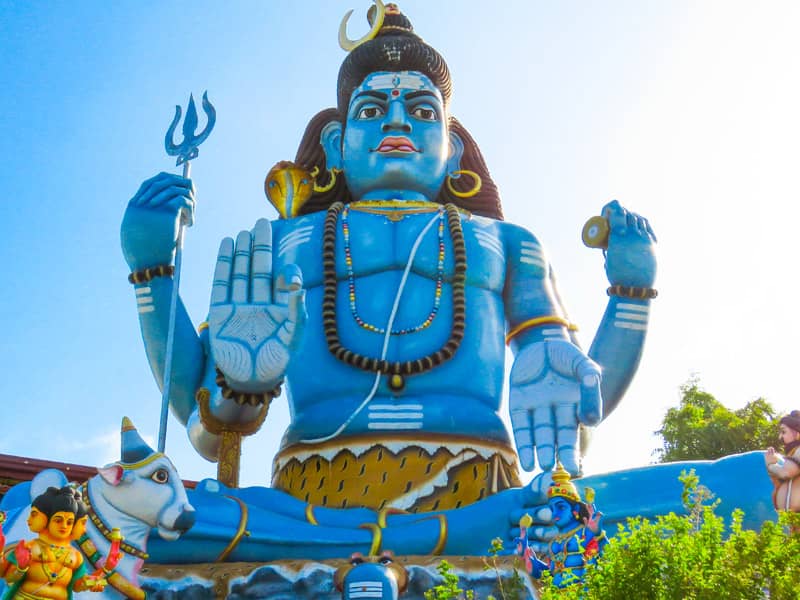Since he's a busy man in a busy city, the special adviser to federal Fisheries and Oceans Minister Herb Dhaliwal has learned to simplify the often-demanding traditions of Hinduism and Sikhism and adapt them to his fast-paced life.
His morning prayer to the Hindu god of the sun takes just one minute. In India, where each temple is dedicated to only one of Hinduism's many deities, Puri and others must travel around to get in their various devotions. But in Canada one temple often serves as the home of 20 deities or more.
That's spiritual efficiency.
Many of the roughly 800,000 Canadians and 2 million Americans who have South Asian origins -- most of whom are Hindu or Sikh or, like Puri, informally blend the two religions -- are finding spiritual shortcuts these days.
They've had to adapt the time-consuming sacred traditions of India, Pakistan and Bangladesh to North America's hectic pace.
"North American culture is more materialistic than in India," says Puri, who is enjoying the festive month of October, when Hindus and Sikhs prepare to celebrate the victory of good over evil that culminates in Thursday's highly popular festival of lights, Diwali.
Several Vancouver-area Hindus and Sikhs with fast-paced lives said they wholeheartedly agree with the findings of a new scholarly book, "The South Asian Diaspora in Britain, Canada and the U.S.," published by State University of New York Press.
It maintains immigrants have had to radically alter their religious lives after moving from the leisurely pace of India to North America, where the Protestant work ethic reigns supreme.
The book, co-edited by Raymond Williams of Wabash College in Indiana, says few East Indians in the United States or Canada, young or old, have the time any longer to memorize long passages from ancient Sanskrit texts, such as the Vedas or Upanishads, as many did in India.
Instead, like Puri, the many South Asian immigrants who want to keep their faith strong in their new homelands do it in bits and pieces while rushing through a typical North American lifestyle of work, exercise, TV, travel and entertainment.
"It's definitely busier here. Making your bread and butter in Canada is the most important thing," says Satyn Banerjee, a Vancouver pathologist who is prominent in Vishva Hindu Parishad in Burnaby. It's one of the country's major Hindu temples.
Like most Sikh and Hindu temples in the United States and Canada, Vishva Hindu Parishad doubles as a kind of community center for both religious and non-religious South Asians. To a greater extent than in India, North American temples have become places for social events, weddings, birthdays, political meetings and basic education in Indian culture, language and faith.
"In India, the rituals are learned in your blood. But here they ... are harder to pick up. We have to be flexible," said Banerjee, who says he recites his personal religious mantra hundreds of times a day while in his car, on the bus or wherever.
Banerjee, who doesn't think he is compromising his faith by being versatile, noted that his son has learned to combine Hindu meditative practices with exercise through the martial arts.
"He has found his Hindu beliefs are similar to those in tae kwon do, where he has a black belt."
Parshotem Goel, a Vancouver real-estate agent, says many young Indo-Canadians have started to stress the philosophy and moral virtues of Hinduism and Sikhism rather than their specific devotional exercises.
"The traditional ways of doing things are getting thrown out. In your busy schedule, you do what is comfortable. That is why Hinduism and Sikhism are good religions, because they're flexible," says Goel.
"The South Asian Religious Diaspora" says society places too much emphasis on racial prejudice and internal conflicts experienced by South Asian immigrants, making it appear as if the communities are problems rather than successes.
Instead, the book urges academics and the media to focus more on the vitality of new immigrants' religious lives and the rising power and diversity of their communities.
It argues that immigrants from India, Pakistan and Bangladesh often strengthen their religion and make it simpler to follow so they can maintain a spiritual life and achieve material wealth in Canada.
It also notes numerous positive trends among immigrants to North America, including that young South Asians are becoming "skilled cultural navigators" who make the best of old and new cultures.
The book is edited by Williams; Harold Coward, a noted Hinduism specialist who is also director of the University of Victoria's Center for Studies in Religion and Society; and John Hinnells of the University of London.

